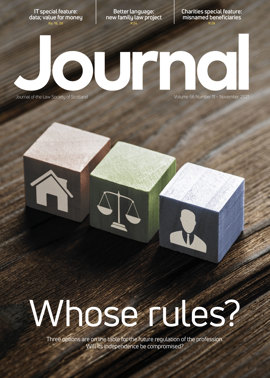Are you listening?

It is a delight to have been asked to write this piece for the Journal, sharing my experiences and thoughts on the relationships lawyers have with their clients and the power of client listening.
Years ago, during my decade as a lawyer in private practice, talking about client listening would have seemed fluffy to me – touchy, feely, marketingy stuff.
My “aha” moment came later. Working on bids and legal directory submissions, I realised the impact of true, unbiased, unfiltered client listening.
When pitching for work, lawyers want to show clients they are the best in their field, but often don’t really know what their clients love and what ticks them off; what they really need their lawyers to do or stop doing; and where their clients sit on the scale from satisfied to loyal.
More often than not, a bid written by lawyers will spout blue chip client names, reel off enviable deal lists and proudly explain the firm’s services and sector expertise. All impressive stuff, but one of the first edits I usually make is highlighting how many paragraphs start with:
- “We”
- “Our”
- “The firm”
- “We believe”
- “We know that”, etc etc.
- “Remember, it’s not about you, it’s about the client,” I say.
Becoming a trusted partner
One of the joys of my work is helping lawyers find their “aha” moment: helping firms go beyond being excellent lawyers, to being a vital and irreplaceable part of their clients’ business.
David Maister said in his must-read book, The Trusted Advisor: “It is ironic that a business in which the serving of clients depends so heavily on interpersonal psychology should be peopled with those who believe in the exclusive power of technical mastery.”
He quotes a former CEO of Deloitte & Touche, who he describes as “someone who very effectively builds lasting relationships, deep relationships”. In the first meeting with a very unhappy client, Maister explains that the most important aspect of the CEO’s approach and skill was the ability to listen. Long story short, having earned the trust of the formerly very unhappy client by listening rather than telling, at a pitch for a high value project years later, the client “looked at me and said ‘Do you think I should do this?’”. The client saw the adviser as a partner; trust had been earned.
Now, as a partner in a reputation and relationship consultancy, I talk to clients of lawyers and other professional advisers all the time. They invariably say that the critical variables in deciding to deepen a partnership are the fundamental, emotional factors like interpersonal chemistry and working relationships.
The pandemic effect
Not surprisingly, 18 months of conducting relationships on Teams and Zoom has been an eyeopener. Exposing our home lives has brought a more human element into day-to-day conversations and shown some of us to be more vulnerable than before, whether we like it or not.
Perhaps as a result, we’ve seen an increase in firms undertaking client review and listening programmes; they are keen to know how they performed during the pandemic and find out what clients want from their lawyers as we return to offices and face-to-face contact.
But why have so many firms waited for something as catastrophic as COVID before prioritising listening to their client views, experiences and future plans?
Those directory rankings...
We recently saw Legal 500 and Chambers & Partners publish their latest UK rankings.
Over the years, I’ve seen lawyers berate the value of rankings. However, as any in-house business development team will tell you, when results day comes, partners are beating a path to their desks, demanding action if they haven’t received the recognition they believe they deserve.
This is often when I get a call: when a team loses its top ranking, I am asked to find out what’s gone wrong and make it right. Invariably, some bad client feedback is to blame for the rankings. And the obvious, often unpopular, answer is, don’t leave it to the directories to ask your clients how much they value you. Instead put your clients’ needs and expectations at the heart of what you do and establish your own structured, independent client listening programme so that you know how they feel and how you can improve your relationships.
Lawyers are smart, commercial, astute, but they often undervalue making the human connection that transitions them to being a true business partner to their clients. While “client listening” might still sound fluffy to some, the impact of earning the respect, empathy, trust and ultimately the ear of clients on a firm’s bottom line can’t be overstated.
More than this, embedding a culture of meaningful client listening in your firm, using independent, knowledgeable interviewers to unearth the issues that often don’t get spoken about otherwise, grows enduring and enjoyable relationships that will continue to drive mutual growth and satisfaction for client and adviser.
Regulars
Perspectives
Features
Briefings
In practice
Online exclusive
In this issue
- Good legal software suppliers listen to you
- The trends that will shape law firms in 2022
- Technology won't solve everything...
- Key trends in legal tech adoption for UK law firms
- The top 4 benefits of moving to a cloud solution
- Why cyber risk management is not the same as IT support
- Business growth: finding the right package







